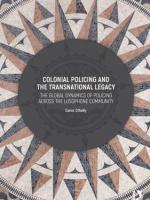Global Dynamics of Policing
The UN and other international agencies herald police reform as a significant component of democratic transitions and post-war reconstruction. This involves strengthening the national police as part of state building, but it also involves transforming often violent and repressive police forces into services that abide by human rights and the rule of law. Since the late 1990s, ‘Community Oriented Policing’ has been promoted as a favored model of democratic policing in transitional and post-conflict societies. The model has also been used in crime-ridden areas of the Global North, and today it has become somewhat of a global export commodity to the Global South. Community Oriented Policing involves closer proximity and partnerships between the police and citizens, which, it is argued, will reduce violent, corrupt and unaccountable police forces.
In her chapter “Post-War Police Reform in Mozambique. The Case of Community Policing”, DIIS researcher Helene Maria Kyed critically scrutinizes the democratizing effects of Community Policing, based on long-term ethnographic research in rural and urban areas of Mozambique. Here community policing involves the integration of young civilian men into groups that work with the state police, doing patrols, investigations and even resolving disputes and punishing criminals. While the work of these young men has reduced crime according to popular perceptions, violence has remained a very significant part of everyday policing and informal punishments. In addition, it has not reduced police corruption. Instead, the young men engage in informal networks of exchanges both together and in competition with state police officers.
Other transnational policing scholars have argued that the solution to these problems of community policing is to substitute it with a ‘professional policing model’ that is squarely focused on strengthening the state police. However, Kyed argues that this model is equally problematic in countries like Mozambique. With its strong focus on the rule of law and the state, it overlooks culturally specific perceptions of justice and that the state police in Mozambique have always relied on and believe that they need to work with civilian actors to combat crime. In addition, the professional model, with its very technical focus on police operations, ignores how policing is implicated in national political contestations and forms of manipulation by the ruling elites. These insights call for a critical examination of both the community policing and the professional models of transnational policing. Each needs to more firmly consider context-specific politics and popular notions of security and justice to be successful. In this sense, Kyed argues that you cannot just export policing models from the Global North to the Global South, without creating contradictory and unintended outcomes.
Kyed’s chapter on police reform in Mozambique is part of an edited volume on policing across Lusophone (Portuguese-speaking) with the title Colonial Policing and the Transnational Legacy. The Global Dynamics of Policing Across the Lusophone Community. It is the first book to examine the historical evolution and shifting global dynamics of policing across the Lusophone community. With contributions from a multi-disciplinary range of experts, it traces the role of policing within and across settings that are connected by the shared legacy of Portuguese colonialism (including Brazil, Angola, Mozambique, Portugal, Macau, and East Timor). Previously neglected within studies of the globalization of policing, the Lusophone experience brings novel insights to established analyses of colonial, post-colonial and transnational policing. This compilation draws research attention to the policing peculiarities of the Lusophone community. It proposes new cultural settings within which to test dominant theories of policing research.
This was said about the book:
Until now, the field of Police Studies has not had a definitive account of the Portuguese colonial empire and its effects on the global dynamics of policing. This book is an excellent example of critical interdisciplinary scholarship that casts new and welcome light on to European colonialism and colonial policing. James Sheptycki, McLaughlin College, York University, Toronto, Canada
This innovative compilation focuses upon policing across the Portuguese Empire and subsequent Lusophone contexts. It underlines how modernity has been marked by policing skills and practices that were forged in earlier processes of colonialism. The lethal violence perpetrated by police units also cannot be reduced to Stoler's 'Imperial Debris' but must also be framed within trends of police professionalisation. The collection also includes fascinating narratives of 'militarized humanitarianism' that help us to both understand and interpret current states of emergency. Emmanuel Blanchard, University of Versailles Saint-Quentin-en-Yvelines, France
DIIS Experts


